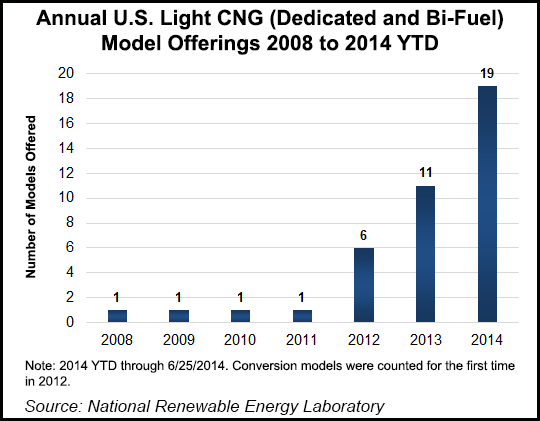Infrastructure | NGI All News Access | NGI The Weekly Gas Market Report
NGVs Roll Both Ways: GM Recalls Vans as More Buses Hit Streets
General Motors (GM) on Thursday said it was recalling 3,196 Chevrolet Express and GMC Savana full-size vans with a compressed natural gas (CNG) option to check for a possible hazard in the vehicles CNG regulator. GM said the recall also includes an additional 13 vehicles in Canada.

The two GM cargo van brands were first offered with a CNG or propane (LPG) option in 2010 (see Daily GPI, May 19, 2010). They were initially available in 2011 models that were sold starting in late 2010, targeted to fleet operators.
In its recall announcement, GM said some of the vans could have a CNG high-pressure regulator that leaks natural gas; however, it also said that it was so far unaware of “any fires, crashes, or injuries as a result of this issue.”
“Dealers or fleet operators will inspect and, if necessary, replace the regulator,” a GM spokesperson said. “Parts are on order and customers will be notified by letter when they are available.”
Four years ago in launching the CNG vans, GM officials said they were responding to requests from fleet operators and following through on a “growing industry commitment to expand the CNG and LPG infrastructure in key fleet markets.”
The GM announcement comes at a time when several major new CNG fueling stations and large transit bus purchases were announced in mid-September, continuing a trend in several regions. The announcements included 80 additional CNG buses in Las Vegas, NV, and another 16 on order in South Bend, IN.
The Regional Transportation Commission of Southern Nevada has $7.67 million worth of plans in place to purchase up to 400 CNG buses through 2017 with the first 80 coming this year from a local dealer, RO Bus Sales.
Upfitter Impco Technologies converted Ford E-450 chassis buses with 6.8-liter natural gas vehicle (NGV) engines to run on CNG. Impco installed a fuel system with Hexagon Lincoln CNG fuel cylinders. Fuel capacity is the equivalent of a 55-gallon gasoline fuel tank.
In Indiana, South Bend-based Transpo recently took delivery of the first of its 16 CNG New Flyer buses, sporting 8.9-liter ISL-G engines by Cummins Westport. Transpo officials said their transit system was the first in the state to have CNG coaches.
Transpo also said it will seek bids in the next few weeks for the construction of a public-access CNG fueling station in partnership with the city of South Bend.
Elsewhere other new CNG stations are being targeted by major natural gas transportation fueling companies: Trillium CNG, Clean Energy Fuels Corp. and TruStar CNG.
Clean Energy has built and opened the largest fast-fill CNG station in Missouri for the Kansas City Area Transportation Authority (KCATA). Clean Energy-IMW compressors allow for a transit bus to be refilled in seven minutes. This permits the transit authority to handle fueling of more than 200 buses each night.
Still in the process of fully converting its bus fleet, KCATA said its move away from diesel fuel to CNG is expected to cut its fuel bill next year by $500,000, and eventually up to $4 million annually when all of the fleet is on CNG.
Separately, in far south-central New York state, Trillium CNG and Mirabito Energy Products opened a public-access CNG fueling station in Kirkwood, NY, near Binghamton. The Class 8 CNG station will operate 24/7 using Trillium’s proprietary fast-fill hydraulic intensifier compressors with three fueling lanes and the capability of being expanded to five lanes.
To the west in Ohio, TruStar CNG said it plans to build a large time-fill and public fast-fill CNG fueling station for Kimble Recycling & Disposal in Canton, OH. It will accommodate up to 55 time-filled Kimble refuse trucks overnight, along with public-access fueling.
Kimble owns and operates more than 600 natural gas wells in Ohio, using them to supply its expanding garbage truck fleet, a TruStar spokesperson said.
© 2024 Natural Gas Intelligence. All rights reserved.
ISSN © 1532-1231 | ISSN © 2577-9877 | ISSN © 1532-1266 |
